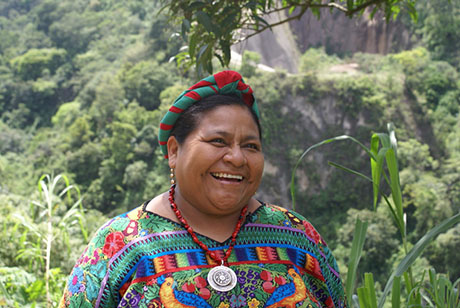FAYETTEVILLE, Ark. — Mayan activist and Nobel Prize winner Rigoberta Menchú will be the focus of a day-long symposium at the University of Arkansas on Thursday, Oct. 8. Ten leading experts on indigenous rights and social justice will discuss “Menchú’s Legacy: Indigenous Women’s Activism, Social Justice, and the Mayan Diaspora.” The public is welcome to attend the symposium.
Rigoberta Menchú, a member of the K'iche' ethnic group in Guatemala, has dedicated her life to publicizing the rights of Guatemala’s indigenous peoples during and after the Guatemalan Civil War. Her testimonial biography I, Rigoberta Menchú (1983), made her an international icon but has sparked disagreement among some scholars over some details of her testimony.
In 1992, Menchú became the first indigenous person to receive the Nobel Peace Prize, and she has continued to work for peace, justice for her people, and international human rights initiatives. She is not taking part in the symposium, but will speak on campus from 7-8:30 p.m. Tuesday, Oct. 13, in the Arkansas Union Verizon Ballroom. Her presentation, the 2015 Winthrop Rockefeller Distinguished Lecture, will be free and open to the public.
Participants in the Menchú’s Legacy Symposium on Oct. 8 will explore a wide range of topics. Panels will take place from 9 a.m. to 3:30 p.m. in the Multicultural Center Lecture Hall (ARKU 403). The event will conclude with a keynote lecture by Arturo Arias beginning at 5 p.m. in Ozark Hall Auditorium (OZAR 26).
Arias is the Tomás Rivera Regents Professor in Latin American Literature at the University of Texas at Austin. His research focuses on Central American literature, with a special emphasis on indigenous literature, and he is considered the foremost expert on the Rigoberta Menchú controversy. He co-wrote the film El Norte (1984) and has published six novels. He has won a wide array of honors and awards and will become the John D. and Catherine T. MacArthur Foundation Endowed Professor in the Humanities at the University of California, Merced, in 2016.
“We are thrilled that Rigoberta Menchú is coming to campus, and we hope that these panels will shed light on the tremendous impact and ramifications of her work,” said Kirstin Erickson, the director of the Latin American and Latino Studies program and co-organizer of the symposium.
Symposium schedule
Panel 1 (9-10:30 a.m.; ARKU 403): Mayan Activism Today: Women/ Youth/Migrants
- Alicia Ivonne Estrada (California State University, Northridge), “Maya Migrant Youth in Los Angeles: Telling Oral Narratives on Border Crossings and Survival”
- A conversation with: Magda Sarat Pacheco and Carlos Rosendo Larios Sarat (Yajaira Padilla and Jessica Lizarazu, translators)
Panel 2 (11 a.m.-12:30 p.m.; ARKU 403): Food, Sovereignty, and Social Justice
- Uché Ewelukwa (University of Arkansas Law School), "Food Security, Vulnerable Communities and International Law"
- Janie Hipp (University of Arkansas Law School), “Food Sovereignty: A Scan of Efforts to Promote Improved Food Access, Alleviate Hunger, and Address Health Disparities”
- Erin Shirl (University of Arkansas Law School), “Practical Solutions for Food Security Problems in Indigenous Communities”
Panel 3 (2-3:30 p.m., ARKU 403): Indigenous Women’s Agency: from the Fracking Fields to Mayan Entrepreneurship
- Toni Jensen (University of Arkansas, Department of English), “Fracture and Song”
- Mirna Ordoñez (University of Arkansas), “Networks: Genesis of, and Paramount Factor in, Mayan Women’s Entrepreneurship”
- Jennifer Gómez (University of Minnesota, Duluth), “In Mayan Women’s Hands: International Networks, Technology and the Global Marketplace”
Keynote Address (5-6 p.m.; Ozark Hall 26)
- Arturo Arias (University of Texas at Austin), “The Political Worlds of an Indigenous Grassroots Activist: Rigoberta Menchú’s Life and Legacy”
The symposium is sponsored by:
- Latin American and Latino Studies Program
- J. William Fulbright College of Arts and Sciences
- Honors College
- School of Law
- Gender Studies Program
- Diversity Affairs
- Office of Latino Academic Advancement and Community Relations
- Native American Studies Committee
About the University of Arkansas: The University of Arkansas provides an internationally competitive education for undergraduate and graduate students in more than 200 academic programs. The university contributes new knowledge, economic development, basic and applied research, and creative activity while also providing service to academic and professional disciplines. The Carnegie Foundation classifies the University of Arkansas among only 2 percent of universities in America that have the highest level of research activity. U.S. News & World Report ranks the University of Arkansas among its top American public research universities. Founded in 1871, the University of Arkansas comprises 10 colleges and schools and maintains a low student-to-faculty ratio that promotes personal attention and close mentoring.
Topics
Contacts
Kirstin Erickson, director, Latin American and Latino Studies
J. William Fulbright College of Arts and Sciences
479-575-5600,
Kendall Curlee, director of communications
Honors College
479-575-2024,
